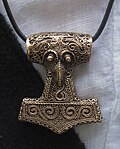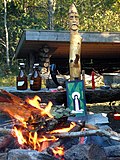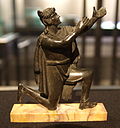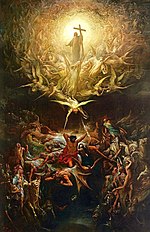 | Heathenry (new religious movement) (redirect from Germanic neo-paganism) Heathenry, also termed Heathenism, contemporary Germanic Paganism, or Germanic Neopaganism, is a modern Pagan religion. Scholars of religious studies classify... 115 KB (14,701 words) - 09:43, 1 April 2024 |
Surviving texts indicate that there was a belief in rebirth in Germanic paganism. Examples occur in eddic poetry and sagas, potentially associated with... 7 KB (994 words) - 07:39, 25 September 2023 |
 | Paganism (from classical Latin pāgānus "rural", "rustic", later "civilian") is a term first used in the fourth century by early Christians for people in... 45 KB (5,005 words) - 05:14, 13 April 2024 |
Proto-Germanic paganism was the beliefs of the speakers of Proto-Germanic and includes topics such as the Germanic mythology, legendry, and folk beliefs... 72 KB (1,709 words) - 02:57, 14 December 2023 |
pagan religion of the Germanic tribal confederation of the Franks has been traced from its roots in polytheistic Germanic paganism through to the incorporation... 12 KB (1,651 words) - 10:22, 6 December 2022 |
Continental Germanic mythology formed an element within Germanic paganism as practiced in parts of Central Europe occupied by Germanic peoples up to and... 3 KB (287 words) - 22:09, 14 December 2022 |
 | In Germanic paganism, the indigenous religion of the ancient Germanic peoples who inhabited Germanic Europe, there were a number of different gods and... 21 KB (696 words) - 18:14, 5 March 2024 |
 | officially Christian, and by 1100 Germanic paganism had also ceased to have political influence in Scandinavia. Germanic peoples began entering the Roman... 18 KB (2,309 words) - 10:19, 2 March 2024 |
 | Human sacrifice (redirect from Human sacrifice in Germanic paganism) none show signs of having died by drowning. By the 10th century, Germanic paganism had become restricted to the Norse people. One account by Ahmad ibn... 137 KB (15,223 words) - 12:56, 16 April 2024 |
 | A prominent position was held by wetlands and islands in Germanic paganism, as in other pagan European cultures, featuring as sites of religious practice... 36 KB (4,316 words) - 11:52, 18 April 2024 |
 | Dís (redirect from Female spirits in Germanic paganism) always referred collectively in surviving references. The North Germanic dísir and West Germanic Idisi are believed by some scholars to be related due to linguistic... 24 KB (2,856 words) - 15:08, 18 February 2024 |
 | Wyrd (category Germanic paganism) beneath the heavens". Like other aspects of Germanic paganism, the concept of wyrd plays a role in modern Germanic Heathenry.[citation needed] The Wyrd Mons... 11 KB (1,198 words) - 23:43, 17 January 2024 |
 | Old Norse religion (redirect from Nordic paganism) also known as Norse paganism, is a branch of Germanic religion which developed during the Proto-Norse period, when the North Germanic peoples separated... 104 KB (13,191 words) - 19:01, 12 April 2024 |
the Germanic languages Germanic name Germanic mythology, myths associated with Germanic paganism Germanic religion (disambiguation) SS Germanic (1874)... 797 bytes (121 words) - 17:25, 11 December 2021 |
Mythology in France (section Middle Ages and Paganism) Frank people are a group of Germanic migrants who find their mythological and spiritual origins in pre-Christian Germanic Paganism. The Franks invaded the... 20 KB (2,426 words) - 08:58, 28 December 2023 |
 | Reincarnation (section Germanic paganism) belief. Surviving texts indicate that there was a belief in rebirth in Germanic paganism. Examples include figures from eddic poetry and sagas, potentially... 153 KB (18,607 words) - 03:11, 13 April 2024 |
 | Neolithic, and it recurs with some frequency on artefacts dated to the Germanic Iron Age, i.e. the Migration period to Viking Age period in Scandinavia... 7 KB (803 words) - 19:29, 18 September 2023 |
In Germanic paganism, a seeress is a woman said to have the ability to foretell future events and perform sorcery. They are also referred to with many... 85 KB (11,068 words) - 19:39, 9 April 2024 |
 | Germanic peoples (including the English) celebrated a midwinter event called Yule (Old English geola or giuli). With the Christianization of Germanic... 120 KB (11,961 words) - 19:53, 6 April 2024 |











